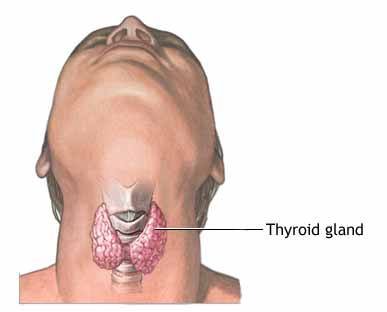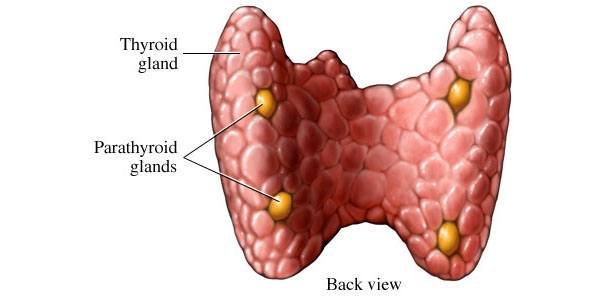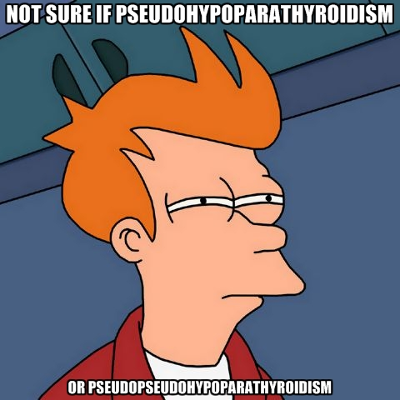G'day team,
Today we'll have a chat about pseudopseudohypoparathyroidism a rare medical condition and arguably the longest word in the English language (at 30 letters).
So let's get started by breaking down exactly what this behemoth means! The word itself is built up from the a set of worlds that do a fairly good job of explaining how the disease was discovered and what it is. So we'll take this approach and hopefully, by the end of this post, everyone will have an awesome understanding of pseudopseudohypoparathyroidism.
- Thyroid
- Parathyroid
- Hypoparathyroidism
- Pseudohypoparathyroidism
- Pseudopseudohypoparathyroidism
Thyroid
The thyroid is a small gland that sits at the front of the throat. It releases Thyroid Hormone which in turn contributes to stimulating metabolic processes throughout the whole body.

Image source
Parathyroid
Now, the term "para" generally means "next to," or "beside", and this is exactly where the parathyroid glands are found, stuck on the back of the larger thyroid gland. The parathyroid gland releases parathyroid hormone, which is an important hormone for regulation of calcium in our body.

Image source
When parathyroid hormone is released it acts to increase blood calcium levels. This means signaling the kidneys to lose less calcium in the urine, making the intestines to absorb more calcium from food and telling the bones to break down and release their calcium into the blood. This will drive up calcium levels in the blood and, according to the mechanisms of negative feedback, slow the release of parathyroid hormone from the parathyroid.
Hypoparathyroidism
Hypoparathyroidism is a condition where our body has low levels of the parathyroid hormone. It's generally caused by damage to the parathyroid gland itself, the most common cause of which is the accidental removal of the gland during surgery on the thyroid, however, some drugs can also hurt do this damage.
Low levels of parathyroid hormone will lead to low levels of calcium in the blood. This can lead to electrochemical imbalances in muscle cells which cause them to contract, leading to abnormally tense muscles.
If left untreated this is can lead to abnormal beating of the heart and as such, it is a potentially a life-threatening condition.
Pseudohypoparathyroidism
So we now understand the consequences of having low levels of parathyroid hormone. But what happens if we have all the signs and symptoms of low parathyroid hormone, but when we test the actual levels of the hormone they're actually high!?
Well, the most likely explanation is pseudohypoparathyroidism, which is so named because it mimics normal hypoparathyroidism. Pseudohypoparathyroidism is actually an umbrella term for five rare genetic disorders, in which parathyroid hormone is produced normally, but the receptor it binds to (specifically the one in the kidney) is not. With the proper messenger, but not the proper target, the end result is still a dysfunctional regulation of calcium levels in the blood. The cells that parathyroid hormone usually acts on never receive their message and behave as if there's no parathyroid hormone in the blood.
Assuming there's no parathyroid hormone in the blood the cells also assume that calcium levels are high, and continue to work to push it down. In turn, the parathyroid will respond to the now very low blood calcium levels and produce more and more parathyroid hormone. The end result is unusual skeletal deformities, as the calcium required to form strong bones is lacking! The deformity that is pathognomonic of pseudohypoparathyroidism is a shortened ring finger, though people with this condition often also have a short posture and round face too.

Image source
Pseudopseudohypoparathyroidism
Now we've reached the end of the line, and not only an extremely rare condition but quite an unusual one. Pseudopseudohypoparathyroidism is a condition where we see the same skeletal deformities is in pseudohypoparathyroidism and in people with the same genetic defect. But in patients with pseudopseudohypoparathyroidism, their blood levels of calcium and parathyroid hormone are normal! The imbalances that are generally seen in pseudohypoparathyroidism are mysteriousely not present.
Unfortunately, this is not a phenomenon that has been well explained, and the impact of this is not fully understood. The condition is so rare that researching it is quite difficult and further understanding will probably take a long time to develop. What we do know is that this condition, by being named for the conditions it is similar too, has created one of the longest words in the English language!

Image source
Thanks
Thanks for reading team, I hope everyone enjoyed the post and learned something new!
For more, have a look at my other recent posts below.
Thanks :)
-tfc
Resources
My Recent Medical Posts
- Missunderstood Body Functions
- Human Anatomy 101 - The Heart (Basics)
- Exercising to Death - What is Rhabdomyolysis
- Metabolic Syndrome - What it is, and why it's KILLING US ALL!!!
- Why is Antibiotic Resistance So Hard to Combat?
- Super Bugs - What is antibiotic resistance and how we are fighting it
- Homeostasis - How our body works
Being A SteemStem Member
Thank you robo-master
Wow. That was the most interesting thing I've read on here in a while. Things like this need to be on steemit more.
Thanks very much :)
Thanks for sharing this interesting phenomenon.
That is often the problem with rare diseases/problems. There are even exceptions in drug regulations for rare diseases, so quite a few small pharmaceutical companies are working on it - a very interesting field of work imho.
Thanks :)
Are you talking about orphan drugs? I'm a little ignorant of the field of pharmaceutical companies inner workings, but I've heard of some orphan drug programs.
We'll get there one day :P
ah yeah, that's the english word I was looking for ;-)
Interesting post @tfcoates, did not know that there is even a term like pseudo-pseudohypoparathyroidism.....
The longest medical word is pneumonoultramicroscopicsilicovolcanoconiosis.. I had to mug it up long ago in the school days for some quiz preparation...
haha yeah thought I must say I find "pneumonoultramicroscopicsilicovolcanoconiosis" a less legitimate term as it was coined by pathologists (and I dislike pathology :p)
Hehe, didn't know it was coined by pathologists... I like pathology :p :)
This is spam post copy and past post.